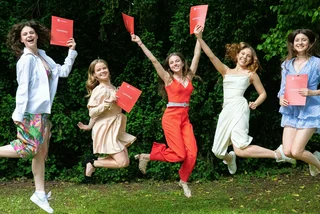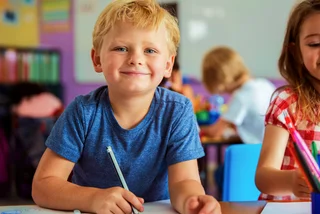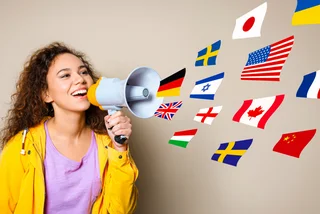Aga Critchlow is Polish-born, but grew up in the United States with American parents. She has a master’s degree in Russian and Eastern European studies and spoke no Czech when she moved to Prague 18 years ago with her six-year-old son, Andrew.
“He was the only foreigner in his school. At this time, putting a child in a public school who didn’t speak Czech was unheard of. He was a celebrity. He managed everything very well and made friends,” she said.
But things changed when Andrew started high school at 14. “He was voicing opinions and wanted to discuss issues. That was not appreciated. The attitude was, you don’t speak, you memorize.”
After transferring Andrew to Educatnet, a private Czech high school where Critchlow now teaches, he was allowed to express himself and “everything got better,” she says.
Despite Andrew’s challenging experience, Critchlow still sent her youngest son to a state school. But his retirement-age teacher made it clear that she had no interest in foreigners. Around the same time, Critchlow started to suspect that her son had learning disabilities, specifically, dyslexia.
“At the end of first grade, the teacher told him: I don't understand why you are not clever if your mother is a teacher.” Shortly thereafter Critchlow enrolled her son at Educatnet.
Bright kids are mislabeled as unintelligent
There are approximately 6,000 foreign nationals enrolled in kindergartens, 25,000 in Czech elementary schools, and 9,000 in high schools according to META, an advocacy organization. META supports the integration of foreigners into Czech public schools and offers programs that teach Czech educators how to support non-native speakers.
‘’These numbers don’t include Czech citizens with foreign parents. No one knows how many people really need language support, and that’s a problem,” said Jan Heinrich, a social worker for META.
Like Critchlow’s boys, many non-Czech-speaking children of foreigners find their confidence damaged by schools that are poorly prepared to teach Czech as a foreign language. In the worst scenarios, children like Critchlow’s youngest are mislabeled as unintelligent or ostracized by teachers and their peers for their inability to communicate in class.
Experiences like Critchlow’s happen for a multitude of reasons, according to Heinrich, but perhaps the greatest challenge schools -- and parents -- face when it comes to integrating non-native speakers into Czech public schools is the lack of a unified system for doing so.
“Each school deals with this on its own, which is why parents have such different experiences,” Heinrich said.
EU grants are available to support Czech language acquisition, but Heinrich said that public schools typically lack the personnel to handle the administrative aspects involved in applying.
‘’Schools can ask for government funding but the money doesn't cover kids with Czech citizenship. Most schools don't even apply for it because it requires extra effort.”
Critchlow’s advice to those families determined to stick it out? “A lot of schools have grants for after-school programs that help develop Czech.”
But if the child isn't happy, she suggests getting out. “Consider a cheaper Czech private school. At a public school, the parent has to do 250 percent more work when it comes to communicating.”
When public and private school fail
Angelica Blake and her husband got out. The couple moved to Prague from South Africa in 2016 and hoped to integrate as soon as possible. But every step of the way, things just didn’t seem to work.
First, Blake sent her five-year-old son Caleb to a Czech-English preschool where she was told the teacher would help him learn Czech. “He didn’t learn any Czech, instead the other kids were learning English from him.”
Blake then sent her son to a private school where he took Czech lessons from the teachers for an additional fee but still didn’t seem to be picking up the language. When she pressed the teachers for an explanation she found communication difficult.
As she could see her son was not progressing in Czech, Blake opted for a public school in Kunratice that had a special program to integrate foreigners.
The program turned out to be a language school an hour away from her home.
‘’He had to wake up at 6 to get there. The school was absolute hell. They didn't know what to do with him, and all the other kids were Russian,” said Blake.
The last straw was when the teacher said to Blake’s son in front of his classmates, ‘’Why aren't you fluent yet?’’ (She also accused Blake’s son of saying “I am fu*ked up’’ after he said he was “fed up “ with the many hours of homework the language-school mandated).
At that point, Blake said she was done with Czech school. “He had lost his confidence and I was exhausted. They could arrest me, put me in jail. Whatever.’’
Let down with the Czech system, she decided to homeschool Caleb with a South African on-line school using the Cambridge curriculum.
“If you have given your all and it's not working out, know when to quit and change your plans. Above all your family's happiness comes first,’’ she said of the experience.
Heinrich said that, like Blake, many migrant parents don’t have the resources they need to succeed in Czech schools or find it hard logistically. But he doesn’t blame teachers.
“There are extreme cases of xenophobia and incompetence,” he said. “It still isn’t a black and white and issue.” Heinrich said there are teachers who have the desire and capacity to help non-native speakers but don’t always get the training or support they need.
“Leadership is a big problem in some schools. I know of schools where the director says, we are a school that only takes selected pupils and indirectly they do everything in their capacity to repel non-native speakers.”
Schools that get it right have one thing in common: teachers who care
There are, however, countless cases of schools getting it right when it comes to inclusion.
Some expatriate parents find that Czech teachers support integration, provide extra help with schoolwork, and take the time to communicate with families despite low pay and overflowing classrooms. Gaelle Vassogne, a French-born history professor is one of them.
Vassogne and her British partner have two children attending ZŠ Slovenská, an elementary school in Prague’s Vinohrady neighborhood.
“We made a conscious decision when our children were born in Prague that they would be integrated into Czech life, so we had a Czech nanny from the start. I understand that’s a luxury,” she said.
Vassogne admits that her ability to speak basic Czech made school communication easier. But there were other factors that ensured the school experience turned out “100 percent positive.“
Her daughter Ellie attended a preparatory Year Zero program before first grade, which helped develop her Czech-language skills in a classroom of 12-15 children. And now that Ellie is going into fourth grade, Vassogne has hired a tutor to help her with the complexities of Czech grammar.
But she mainly attributes her daughter's successful integration to the teacher's positive attitude.
“We are so lucky we have a wonderful teacher. During lockdown she made appointments by Skype to talk with parents individually and see how things were going. Our school really wants international children.”
Ellie is the only one in her class without a Czech parent, but she is well accepted by her peers. When Ellie told her classmates that she wasn’t Czech, they responded, “Yes you are, you speak Czech, you come to this school.”
From urban Israel to a village in Moravia
And it’s not just in Prague that foreign children are enthusiastically welcomed into elementary schools.
Maya Harel and her husband moved from urban Israel to rural Czech Republic in search of what they believed would be a safer, calmer and more supportive education for their children, 8 and 5.
The family resides in Trstěnice, a small South Moravian village with a population of 500. Harel feels her children have been very welcome at the tiny local school. “There is so much less bullying here than my daughter had in Israel. They are excited to see and meet English speakers and we are the only English speakers in the school.”
Harel's daughter was among the handful of children in first grade, so she receives a lot of support and attention in her effort to learn Czech. Harel said she and her husband are also “diligently” learning the language.
“Ironically, I think we would experience more xenophobia if we lived where there were a lot more foreigners,” said Harel.












 Reading time: 6 minutes
Reading time: 6 minutes 
































